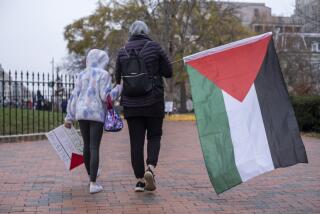A Pakistani Saga of Fraternal Rivalry
- Share via
In a prologue to his stunning first novel, “Moth Smoke,” Mohsin Hamid draws attention to a fraternal conflict as mythic as Cain and Abel’s. A Sufi saint prophesies a battle of succession between the sons of Shah Jahan, the Moghul Emperor best known in the west for the mausoleum he built to his departed wife, Mumtaz, the Taj Mahal. Sure enough, the youngest son, Aurangzeb (“Conqueror”), beheads the eldest, Dara Shikoh, and imprisons their aging father in the Red Fort of Agra, where he looks out from his cell at the monument to his beloved wife. “Perhaps he doubted, then, the memory that his boys had once played together, far from his supervision and years ago, in Lahore. When the uncertain future becomes the past, the past in turn becomes uncertain.”
Uncertainty about the past is just a fancy name for a bad memory--and bad memories, as Hamid reminds us, are the foundation of present-day life on the subcontinent. While the Moghul Empire has long been divided, its two most powerful descendants are the brothers Pakistan and India. But the 1947 partition is already ancient history (and well documented in myth in Salman Rushdie’s “Midnight’s Children”). Hamid sets his fraternal conflict in 1998, in the Pakistani border city of Lahore, during the days of ominous rumblings when India and Pakistan tested atomic bombs and joined the nuclear family.
Hamid’s modern-day conqueror is also named Aurangzeb, Ozi to his friends. He is one of Lahore’s jeunesse doree, the son of a corrupt civil servant of unimaginable wealth, a product of private schools and foreign universities and air-conditioned, hashish-perfumed parties where bootleg Johnnie Walker Black flows like the beard of the Prophet. Ozi’s spiritual brother is an old school chum named Daru, raised almost as another son by Ozi’s father after the death of Daru’s own father. Yet “almost” is always the motive for fratricide. Although equally charming and intelligent, Daru stays in Lahore and attends public university while Ozi goes to the States and law school. Forced to support his mother, Daru gives up on a golden academic career for a job in a bank, while Ozi makes even more money studying tax shelters. Ozi drives a Pajero, Daru a Suzuki.
1998 finds Aurangzeb newly returned from New York, taking up his dynastic position laundering money for those even wealthier and more corrupt. But 1998 finds Daru without a job. Fired for insulting a client, Daru discovers that without a foreign degree no other bank or multinational will hire him. As Lahore palpitates beneath the summer heat and nuclear excitement, Daru sinks deeper and deeper into an uncertain future. No job means no money, no money means no electricity, and no electricity means loss of identity.
“There are two social classes in Pakistan,” according to Daru’s former mentor, Professor Julius Superb. “The distinction between members of these two groups is made on the basis of control of an important resource: air-conditioning.”
Yet even though he becomes one of Lahore’s “great uncooled,” Daru does profit from his loss. Ozi has returned from the States with a beautiful and dissatisfied wife named Mumtaz. With both Daru and Mumtaz’s futures so uncertain, it is no wonder that they forget the past and their separate allegiances to Ozi and form a new alliance in each other’s arms. Out of these age-old conflicts, Hamid, who lives in New York, has created a hip page-turner about the mysterious country that both created the sophisticated Benazir Bhutto and hanged her father. He flies his pair of moths, Daru and Mumtaz, like an expert kite fighter, singing wings and fraying strings. Eventually, of course, their situation, mythic as it may be, becomes nuclear. But Hamid is wise enough to know that, although deterrence might work between states, between brothers there must always be a winner.
More to Read
Sign up for our Book Club newsletter
Get the latest news, events and more from the Los Angeles Times Book Club, and help us get L.A. reading and talking.
You may occasionally receive promotional content from the Los Angeles Times.










